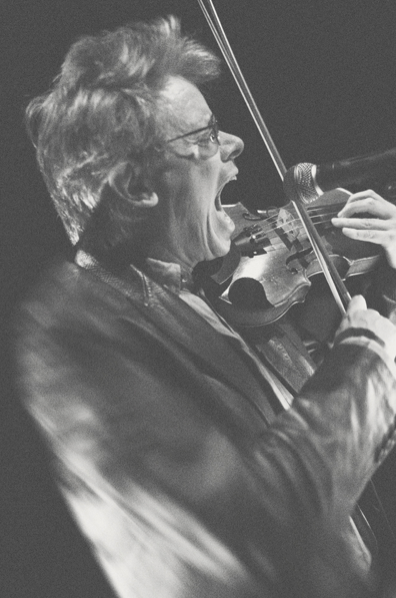


Charlton Singleton

Program Notes
Testimony
(2019)
Charlton Singleton
(b. 1971)
Composed for
50 For The Future:
The Kronos Learning
Repertoire
Artist Statement
“Growing up in the church (my father is now a retired African Methodist Episcopal Church pastor) I was surrounded by Praise in many forms, but especially through music. Some of the things that I experienced frequently were special programs, aside from the regular Morning Worship on Sundays: Choir Anniversaries, Usher Anniversaries, and ‘Singings.’ It was normal to be in attendance of these programs from the early afternoon into the night. As a young musician growing up around many other musicians, I naturally observed and took in a lot. One of the things that I recognized later in my life, reflecting back on my childhood musical experiences, was the level of musicality from some of the ‘ordinary’ parishioners in church. I recalled that they almost always had incredible harmonies that weren’t necessarily the norm, as well as incredible timing with regards to rhythm. Those two traits made musical experiences at church pretty awesome.
“At a lot of the ‘Singings,’ where there would be choirs and other vocal ensembles from area churches, I would frequently see a Prayer Band. This is not an ordinary band. This band is usually three to four people who have their voices, their hands, and their feet to create music. The Prayer Band usually has the responsibility of getting the congregation prepared for worship. Today, it is simply known as the Praise and Worship Band or Ensemble, and they usually have a rhythm section backing them.
“Here is how the Prayer Band would operate: There is someone that usually ‘raises up’ (or starts singing) a song. It may be a song that is familiar to everyone or it may not be familiar at all. If it is unfamiliar, then it’s usually pretty easy for everyone to catch on quickly. At the beginning of these songs, there could be a prayer or chant where the rest of the members are humming or moaning. At the conclusion of the prayer or chant, the person leading it will start a faster song, which then leads to a lot of ‘praise and worship’ in the congregation. At the conclusion of their song, there will be another member of the Prayer Band that takes over, and the whole process is repeated.
“Testimony is written from the Prayer Band experience, and from specific rhythms in African American churches and communities—the ‘Gullah Clap’ (on beats two, two-and, and four) and the ‘Half Clap’ (on beat one only).”
Composer Interview
Charlton Singleton discusses his musical background, his composition process, his relationship with Kronos, and more.

There's no question that this repertoire needed to include an element highlighting the oldest African presence in America and the way that is manifested in music today, especially as the South Carolina Lowcountry faces erasure through climate change. Charlton made this perfect piece for us, one that professionals and beginners alike will be able to play and learn from. I hope these works encourage us all to learn more about our own cultural history, and what goes into making what we call "American music."
Performance Video
Kronos Quartet performs Testimony at Stanford University's Bing Concert Hall.
Artist’s Bio
Charlton Singleton
USA
A native of Awendaw, South Carolina, Charlton Singleton began his musical studies at the age of three on the piano. He would then go on to study the organ, violin, cello, and the trumpet throughout elementary, middle and high school. In 1994, he received a Bachelor of Arts in Music Performance from South Carolina State University. Since that time, he has taught music at the elementary, middle, and high school levels, as well as being an adjunct faculty member at the College of Charleston. In 2008 Charlton co-founded and served as the Artistic Director and Conductor of the Charleston Jazz Orchestra; an 18-piece jazz ensemble of some of the finest professional musicians in the Southeast and the resident big band in Charleston, SC. He remained in this position until 2018. Singleton is also the organist and choir director at St. Patrick Catholic Church in Charleston, South Carolina. In November of 2016 he was named the inaugural Artist in Residence at the recently renovated Gaillard Center in downtown Charleston.
As a performer, Singleton leads his own ensembles that vary in size and style. He is a member of a new ensemble called Ranky Tanky, a quintet that interprets the sounds of Gullah from the Southeast Coast of the United States. In addition to performing, he is also a speaker, composer, and arranger.

Testimony introduced us to a whole new way of making music. Normally we'd work on matching articulation and sound, but this piece celebrates the differences in the way people sing and move, and Charlton encouraged us to channel those differences in our playing.
Support Kronos’ 50 for the Future
Help support Kronos’ 50 for the Future as we commission fifty new works designed expressly for the training of students and emerging professionals.
Kronos Quartet
World Premiere



